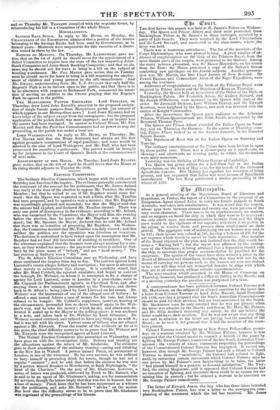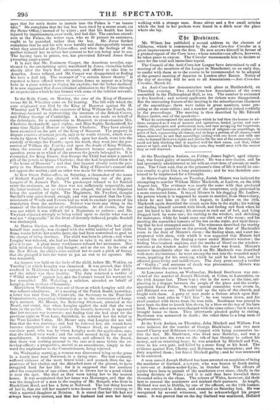gbr itletropolis.
At a general meeting of the Marylebone Board of Directors and Guardians, on Friday, the report of a Committee on the proposal of an Emigration-Agent named Lake, to carry ten female paupers to South Australia, was taken into consideration. It was stated that the women, whose ages were between sixteen and twenty-six, were persons of the very worst character. There was to be no superintendent, no matron, and no surgeon on board the ship in which they were to be conveyed the only check upon any communication between them and the ship's crew would be the vigilance of the Captain; and there is no person in the colony to receive them, and procure them employment on their arrival. The aggregate cost of maintaining the ten women was said to be 91/.; their labour was valued at 781., leaving a balance of 13/. for the net expense which would be saved by their deportation. One member of the Board objected to the plan, and declared that the ship would be- come a "floating hell "; but the report was affirmed by the casting- vote of the Chairman ; it being arranged that a deputation should visit the ship, to ascertain that proper accommodation be provided for the emigrants. The agents of the vessel have since written a letter to the Board of Directors and Guardians, declaring that they will not be the means of carrying out persons such as the women are now ascertained to be ; nor will they send out unmarried females in ships with which they are at all connected, without suitable superintendence. The conversation which occurred in the House of Commons on Thursday, however, has produced a different feeling in the Board ; and at a meeting yesterday the question was postponed for a time.
A correspondence has been published between" Colonel Torrens and Mr. Mackinnon, on the subject of an alleged assertion by the latter that a letter from Colonel Torrent; to Lord John Russell, dated December 9th 1839, opening a proposal that the South Australian Commissioners should be paid for their services, had not been sanctioned by the Board. Mr. Mackinnon says he only asserted that he was not present when the letter was adopted by the Board ; and that as Mr. Hutt, Mr. Palmer, and Mr. Mills declined receiving any salary, he did not believe the letter would have their sanction. But he was not aware that any thing was said in allusion to the letter not having had the sanction of the Board ; as he took it for granted that it had the sanetion of the mem- bers present. Colonel Torrens was brought up at Bow Street Police-office, yester- day, on a warrant obtained by Mr. William Palmer, because it was supposed that the Colonel meant to commit a breach of the peace by
fighting Mr. George Palmer, a member of the late South Australian Commission; the veracity of whose statements respecting the proceedings of the Commissioners Colonel Torrens has impugned. It turned out, however, that though Mr. George Palmer had sent a friend to Colonel Torrens to demand "satisfaction," the Colonel had refused to fight, until, by retracting certain statements which Colonel Torrens says he can prove by Mr. Palmer's own handwriting to be false, the latter "had placed himself in a position to demand satisfaction." Mr. Twy- ford, the sitting Magistrate, said it appeared that Colonel Torrens had no intention of fighting, and therefore there could be no reason for de- taining him in custody • but he ordered a warrant to be executed on Mr. George Palmer immediately.
The father of Edward Jones, the boy who has three dines intruded into Buckingham Palace, has sent a letter to the newspapers, com- plaining of the treatment which the lad has received. Mr. Jones
says that his son's desire to intrude into the Palace is "an insane idea." He complains that the boy has been tried by a secret court, (at the Home Office,) instead of by a jury ; and that his health has been injured by imprisonment, over-work, and bad diet. The careless attend- ants at the Palace, the writer says, who so ill protect its entrances, ought to be punished rather than the boy. Mr. Jones further complains that he and his wife were harshly and disrespectfully treated -when they attended at the Police-office, and when the feelings of the mother induced her to refuse her consent to her son being sent to sea. The having been in prison, too, has prevented Edward Jones from procuring employment. It is said that Mr. Fenimore Cooper, the American novelist, cap- tivated by the enterprising spirit manifested by Jones, visitedhis father shortly after the boy's first adventure, and offered to take him to America. Jones refused, and Mr. Cooper was disappointed at finding his hero a dull lad. The manager of "a certain minor theatre" is reported to have offered terms to induce Jones to appear as a living hero in a piece written to display his exploits ; but the filther declined. It is now supposed that Jones obtained admission to the Palace through an acquaintance which he has formed with some of the inferior servants.
In the Rolls Court, on Monday, the case of the King of Hanover versus Sir H. Wheatley came on for hearing. The bill with which the ease originated was filed by the King of Hanover against Sir H. Wheatley and T. Wood, the executors of King William the Fourth, the Attorney-General as representing the interests of the British Crown, and Prince George of Cambridge. A motion was made on behalf of the defendants, for a commission to Hanover, to cross-examine Mrs. Charlotte Beckendorff, aged eighty, and Miss Sophia Beckendorff, for some time Maids of Honour to Queen Charlotte. They have already been examined on the part of the King of Hanover. The property in dispute consists of certain jewels, said to be worth 50,000/., which were worn by Queen Charlotte ; and which, upon her death, went into the -custody of George the Fourth ; upon his death, they went into the pos- session of William the Fourth ; and upon the death of King William, -when the crowns of England and Hanover became separated, the question arose as to which of the crowns the jewels belonged to. It is contended for King Ernest, that George the Third had made a special gift of the jewels to Queen Charlotte ; that she had bequeathed them to "the house of Hanover" ; and that that bequest clearly vests the pro- -oerty in the Hanoverian crown. The King of Hanover's counsel did not oppose the motion ; and an order was made for the commission.
At Bow Street Police-office, on Saturday, a shoemaker of the name of Richard Saudall was charged with assaulting one of the gate- keepers of St. James's Park. The gatekeeper refused to let Sandal! enter the enclosure, as his dress was not sufficiently respectable, and the latter resisted ; but no violence was alleged, the point in litigation being the question of right. The Magistrate, Mr. Twyford, thought Sandall's coat quite decent enough, and was persuaded that the Com- missioners of Woods and Forests had no wish to exclude persons of his description from the enclosure. Neither was there any thing in the _ manner of the defendant at all objectionable. At all events, the law was one which it was difficult for a Magistrate to enforce ; and Mr. Twyford objected strongly to being called upon to decide what was or was not " respectable " in the dress of decently-behaved people. Sandell was discharged.
At Hatton Garden, on Saturday, Harriet Longley, who had given herself into custody, was charged with the wilful murder of her child. Some weeks before her confinement, she had been committed to gaol on the charge of being destitute. The child was born in prison ; and when Longley was released, she had no home to take it to, and nothing to „give it to eat. A great many workhouses refused her assistance. Her milk dried up from fatigue and hunger ; and as she sat by the side of the New River, the child's cries excited her to such a pitch of frenzy that she plunged it into the water to put an end to its agonies. She was remanded.
Au inquest was held on the body of the child, before Mr. Wakley, on Tuesday ; at which Longley was examined. It was proved, that while confined in Maidstone Gaol as a vagrant, she was kind to her child ; and the infant was then healthy. The Jury returned a verdict of "Wilful murder" against her, and the Coroner issued his warrant for her committal. Mr. Wakeling, a solicitor, attended on behalf of Longley, from motives of humanity.
Marylebone Workhouse was one of those at which Longley said she was refused admittance. At a meeting of the Parish Board, yesterday, a letter was read from Mr. Chadwick, the Secretary to the Poor-law Commissioners, requesting information as to the correctness of Long- ley's account. Mr. Messer, the Relieving Overseer, attended at the Board, and stated, that when Longley applied she said that she was born in the parish. On reference to the records, however, it appeared that her account was incorrect ; and finding that she had slept on the previous night in West Lane, Smithfield, he referred her for relief to the West London Union. Mr. Messer says that Longley did not tell bins that she was starving; and had he relieved her, she would have become chargeable to the parish. Thomas Read, an Inspector of -out-door poor, who was by when Longley made the application, says that she looked very weak ; and the child seemed dying for want of nourishment. A resolution was moved, and affirmed by the Board, -that there was nothing unusual in the case as it came before the re- hewing-officer; a proposition, moved as an amendment, simply to for- ward the explanation to the Commissioners, being rejected.
On Wednesday morniag, a woman was discovered lying on the grass in a lonely lane near Norwood, in a dying state. She had evidently suffered violence of the most brutal kind ; and seemed, from the ap- pearance of her clothes and the disturbed state of the ground, to have struggled hard for her life ; for it is supposed that her assailant -after the completion of one crime, tried to drown her in a pond which is near the spot. She died as they were taking her to the nearest house. It was ascertained that her name was Messenger, and that she was the daughter of a man in the employ of Mr. Roupell, who lives in Blackfriars Road, and has a farm at Norwood. The last thing known of her is, that she left her master's town-house on Tuesday evening, to visit a married daughter at Brixton. It is stated that her life had not .always been very correct, and that her husband had seen her lately
walking with a staange man. Some silver and a few small articles which she had in her pockets were found in a ditch near the place where she lay.



























 Previous page
Previous page